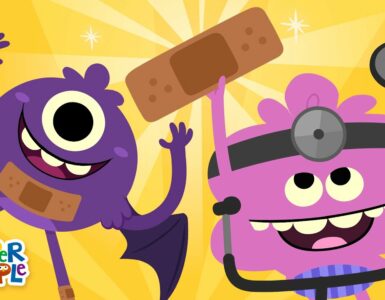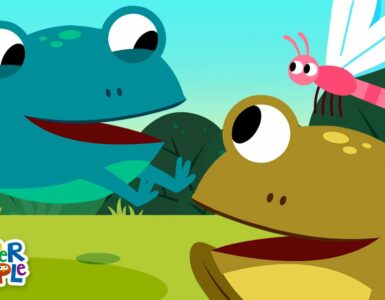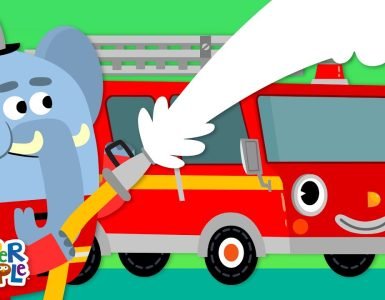If I Were a Duck Super Simple Songs is an imaginative exploration of childhood, teaching valuable lessons through playful lyrics and catchy melodies. This delightful song invites children to envision the world from a duck’s perspective, igniting creativity and sparking joy. In this article, we will delve into the engaging themes of the song, its educational benefits, and practical ways to incorporate it into everyday learning.
Exploring the Themes of If I Were a Duck Super Simple Songs
In the realm of children’s music, few songs possess the charm and whimsy that “If I Were a Duck” brings to its listeners. The simple melody and engaging lyrics provide a rich tapestry for imagination, encouraging children to think outside the box. Let’s take a closer look at the thematic elements that make this song resonate with young minds.
More: Yes Yes Play Outside Song CoComelon Nursery Rhymes
The Joy of Imagination
Imagination serves as the foundation of childhood playfulness.
Through songs like “If I Were a Duck,” kids are introduced to fantasy, allowing them to escape into a world of wonder. When children sing about being ducks, they aren’t just reciting words; they’re building a narrative in their minds.
Imagining life as a duck can lead to vibrant stories filled with adventure. What would it be like to waddle across a park? How would it feel to splash in a puddle? These questions not only stimulate creativity but also enhance verbal skills as children articulate their thoughts and ideas.
Moreover, embracing imagination nurtures problem-solving abilities. As children explore various scenarios – from flying high in the sky to swimming swiftly in a pond – they learn to navigate challenges and develop critical thinking. It’s fascinating how such whimsical tunes can foster deeper cognitive development.
Connection to Nature
“If I Were a Duck” serves as a bridge connecting children to nature.
By personifying a duck, kids gain a unique perspective on wildlife. They begin to understand the importance of ecosystems, habitats, and the roles different animals play within their environments. This connection can lead to a lifelong appreciation for nature and wildlife conservation.
Furthermore, the song encourages curiosity about the natural world. Children may become interested in exploring parks, ponds, or nearby lakes, fostering a spirit of inquiry. By observing real ducks and other wildlife, their understanding of animal behavior deepens, promoting environmental stewardship at an early age.
Additionally, integrating songs like this into daily routines can lead to discussions about seasons, weather conditions, and animal migration patterns, creating an enriching learning experience that extends beyond music.
Social Interaction and Cooperative Learning
Music has a unique power to bring people together, and “If I Were a Duck” is no exception.
Singing and dancing to this cheerful tune can create bonding experiences between friends or family members. It fosters social interaction as children engage in group activities, whether they’re performing actions that mimic being a duck or simply enjoying the rhythmic flow of the song together.
Cooperative learning is enhanced as they share their interpretations of what it means to be a duck. Conversations sparked by the song encourage teamwork, communication skills, and empathy as children listen to one another’s perspectives.
This collaborative aspect reinforces the notion that education occurs both individually and socially. Children learn to respect differing viewpoints while developing their own unique identities.
Practical Applications of If I Were a Duck Super Simple Songs
Beyond its musical appeal, “If I Were a Duck” presents multiple avenues for parents and educators to engage children in meaningful ways. Here, we’ll explore various practical applications that can help integrate the song into diverse settings.
Incorporating Music into Daily Routines
Music can transform mundane daily activities into enjoyable routines.
For instance, parents can start mornings by playing “If I Were a Duck” during breakfast or while getting ready for school. This routine may motivate children to participate actively in preparation, setting a positive tone for the day ahead.
Additionally, music can be utilized during transitions throughout the day. Whether it’s cleaning up toys or getting ready for bedtime, incorporating the song can turn these tasks into lighthearted moments. Children are more likely to comply when they associate chores with fun melodies.
Using music to mark specific times during the day creates a rhythm that children can anticipate. Anticipation can build excitement, consequently leading to smoother transitions and reduced resistance.
Engaging in Creative Arts Activities
Artistic expression can thrive alongside musical exploration.
After singing “If I Were a Duck,” teachers can organize art projects where children illustrate their visions of duck life. Whether using watercolors, crayons, or collage techniques, children can express their interpretations of the song through visual arts.
Additionally, storytelling sessions can be creatively intertwined with the song. Encouraging children to narrate their own stories about being a duck allows them to explore characterization and plot development. Group storytelling can enhance listening skills as peers share their tales, leading to collaborative narratives.
The combination of music and art enhances multisensory learning, promoting stronger connections between concepts. Children who engage with both mediums are often able to internalize ideas more effectively.
Creating Interactive Movement Experiences
Movement plays a crucial role in children’s development, contributing to physical health as well as cognitive growth.
When introducing “If I Were a Duck,” encourage children to pair actions with the lyrics. Incorporating motions such as waddling, flapping arms, or pretending to swim can deepen their engagement. Dance breaks coupled with singing can boost physical activity levels.
Innovative games can stem from the song as well. For example, creating an “Animal Parade” where children imitate various animal movements can reinforce the joy of being creative while having fun. Such activities can also develop gross motor skills and coordination.
Moreover, movement helps with energy regulation. Providing opportunities for children to express themselves physically can reduce restlessness, promote focus, and enhance overall well-being.
Educational Benefits of If I Were a Duck Super Simple Songs
Songs like “If I Were a Duck” serve as powerful educational tools in multiple domains.
From language development to emotional intelligence, let’s analyze how this fun song enriches children’s learning experiences.
Language Development and Literacy Skills
Engaging with music provides rich opportunities for enhancing language skills.
As children sing along with “If I Were a Duck,” they practice pronunciation, vocabulary, and rhythm. Repetition in lyrics aids memory retention, making it easier for young learners to expand their linguistic repertoire.
Additionally, the song introduces descriptive language, prompting kids to think critically about their surroundings. They may ask questions about ducks or similar animals, leading to vocabulary-building discussions.
Regular exposure to music can also facilitate phonemic awareness, which is vital for reading readiness. Singing engages different areas of the brain, supporting auditory discrimination and improving overall literacy skills.
Emotional Awareness and Expression
Songs evoke emotions, and “If I Were a Duck” is no exception.
Children may express joy while singing, but they can also relate to deeper feelings – such as curiosity or even loneliness. Engaging with this song encourages kids to reflect on their emotions, providing a safe space to explore complex feelings.
Furthermore, using the concept of emulating a duck can lead to discussions about empathy. For example, children may contemplate how ducks interact with each other and their environment. Encouraging them to think about how others feel fosters emotional intelligence, a key skill in navigating social interactions.
Creating a safe environment where children can express their feelings openly nurtures resilience and self-awareness. Music becomes a tool for introspection, allowing children to connect with their inner selves.
Reinforcing Cognitive Skills Through Play
“If I Were a Duck” serves as a catalyst for various cognitive skills.
From sequencing the lyrics to discussing the implications of being a duck, children strengthen their critical thinking abilities. The playful nature of the song encourages exploration and innovation.
Activities inspired by the song can include sorting games (e.g., identifying animals in nature vs. those that aren’t) or categorizing sounds made by different creatures. Such exercises hone analytical thinking while keeping the learning experience enjoyable.
Moreover, engaging with music stimulates creativity, inviting children to brainstorm new verses or alternative scenarios. This kind of imaginative exercise enhances divergent thinking, vital for problem-solving and innovation later in life.
Cultivating a Love for Music and Rhythm Through If I Were a Duck
Embracing music from a young age fosters a lasting appreciation for the arts.
“If I Were a Duck” serves as an excellent introduction to the joyous world of music, leading children to discover rhythms, melodies, and harmonies beyond the lyrics.
Building Musical Awareness and Appreciation
Exposing children to music sets the stage for cultivating musical awareness.
Through repeated listening, children can identify patterns, recognize different instruments, and even develop preferences for certain genres. “If I Were a Duck” embodies playful simplicity, making it ideal for fostering a love for music without overwhelming young audiences.
Encouraging children to explore various musical styles can broaden their appreciation. Parents and educators might play different versions of the song or introduce other child-friendly tunes to create a diverse musical landscape.
Celebrating music as a form of expression can empower children to explore their musical talents. Opportunities for learning instruments or joining singing groups can emerge from this initial spark of interest, leading to lifelong passions.
Fun Rhythmic Activities
Rhythm is an essential component of music, and it can be explored in many engaging ways.
Utilizing clapping, tapping, or dancing can bring the song to life, helping children connect with the beat. Simple rhythm activities can include following the tempo with body movements, creating a joyful atmosphere as they learn together.
Teachers can introduce games that involve creating sounds or beats using everyday objects (like pots, pans, or bottles). This playful exploration develops an innate sense of rhythm, enhancing musicality over time.
Moreover, encouraging improvisation lets children experiment with their creativity. As kids invent their unique sounds or melodies, they engage deeply with music’s fundamental aspects, enhancing enjoyment and understanding.
Early Exposure to Music Theory Concepts
Introducing basic music theory concepts alongside songs can lay a solid foundation for future musical learning.
While “If I Were a Duck” may appear simplistic, it can serve as a springboard for basic discussions about notes, pitch, and dynamics. Understanding these concepts can demystify music and allow children to appreciate its complexity.
Children can engage in activities that involve matching pitches or experimenting with volume changes while singing the song. Such hands-on experiences reinforce theoretical understanding while maintaining the fun.
By establishing a rich basis of musical knowledge early on, children become more equipped to appreciate a broader spectrum of music as they grow older.
Conclusion
If I Were a Duck Super Simple Songs opens the door to a world of creativity, learning, and joyful exploration. Through the imaginative lens of being a duck, children engage in imaginative play, connect with nature, and develop essential cognitive and emotional skills.
Whether incorporated into daily routines, artistic activities, or interactive movement experiences, this charming song provides endless opportunities for enrichment. As parents and educators embrace the song’s educational benefits, they lay the groundwork for a lifetime love of music, nature, and exploration.
Together, we can cultivate a generation of curious, empathetic, and creative individuals, all sparked by the enchanting melody of “If I Were a Duck.”
















